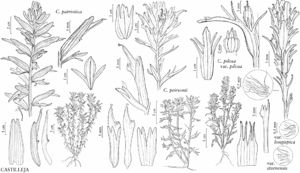Castilleja pilosa var. steenensis
in A. Cronquist et al., Intermount. Fl. 4: 480. 1984.
Stems: hairs retrorse or spreading, ± curved, stiff, 0.5–0.8(–1) mm. Leaf lobes widely spreading. Inflorescences 2.5–10 cm; bracts proximally greenish, light dusky pink, or salmon, with margins or distal portions the same color or yellow or white, 3–5-lobed; lobes spreading to ascending, short to long, arising below mid length. Calyces (12–)14–20(–28) mm; abaxial and adaxial clefts 5–12 mm, 45–50% of calyx length, lateral 5–12 mm, 45–50% of calyx length; lobes linear to lanceolate. Corolla beaks 4.5–6.5 mm; abaxial lip purple or pink, sometimes pale yellow, distally sometimes white, 3.5–6 mm, 75–100% as long as beak; teeth white or pale yellow.
Phenology: Flowering May–Aug.
Habitat: Rocky slopes, ledges, dry meadows, sagebrush steppes, subalpine to alpine, volcanic soils.
Elevation: (1900–)2000–2900 m.
Discussion
Variety steenensis is endemic to the upper elevations of Steens Mountain in Harney County. It appears distinct when seen in its dwarfed form on the highest slopes; some transitional plants exist at lower elevations where it encounters var. pilosa. Genetic studies of this complex are in progress.
Selected References
None.
